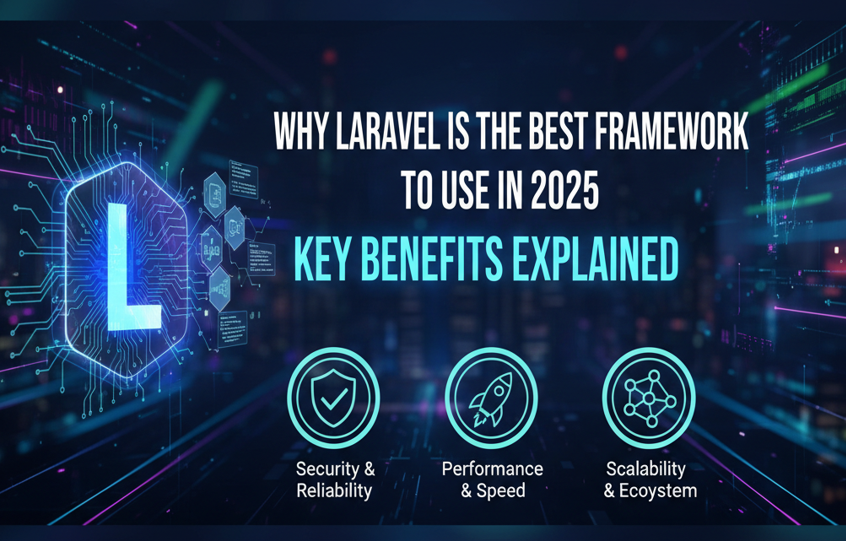Do you know that the tech-savvy mostly use the framework Laravel? About 1.6 million developers use the Laravel framework for building robust applications with features, elegant syntax, and a thriving ecosystem and community. Let’s dive deeper and explore why the Laravel framework is most popular among tech-savvy developers, and its top features. Let’s get started!
What is Laravel?
Laravel is an open-source PHP web application framework that follows the Model View Controller (MVC) pattern. Tech-savvy find it to be a great option due to its elegant syntax, built-in authentication and authorization, artisan command line interface, seamless third-party integrations, and more. While it’s mainly used for backend frameworks, Laravel can also be used for full-stack development in PHP. You can craft front-end systems using React or Vue and build powerful backend APIs.
Laravel is most popular due to its built-in tools, which make it different from other users and help speed up the development process and reduce the need to start from scratch.
Top Reasons to Use Laravel in 2025
So, are you still confused about why most developers rely on the Laravel framework? Here are the top reasons developers and businesses trust it for web application development:
1. Microservices Architecture for Modular, Scalable Applications
Laravel makes building microservices easier with its event-driven designs, lightweight frameworks, and stronger API tools. Laravel website development services produce horizontally scalable, fault-tolerant systems that can handle changing workloads.
2. Future Proof Ecosystem And Thriving Community
The Laravel ecosystem is continuously evolving, expanding its libraries, including powerful tools such as Forge for server provisioning and deployment, Vapor for serverless infrastructure using AWS, Nova for admin panels, and Envoyer for zero-downtime deployment. Due its regular updates, documentation, and a lively international community, Laravel developers ensure that they work with modern development standards and help them craft scalable, enterprise-level apps.
3. API First Architecture for Omnichannel Platforms
Laravel is best for API first development, with easier features such as Resource Controllers, rate limiting, and token-based authentication with Passport. All these tools help integrate Laravel easily with mobile applications, IoT systems, and JavaScript frontends. Built-in API resource transforms provide consistent and clean JSON responses on every platform.
4. Progressive Web App (PWA) Enablement
Laravel works for web applications, with service workers, Laravel Mix, and frontend tools, like Vue.js, to support progressive web apps. For today’s mobile-focused users, this enables developers to create web apps that load faster, function offline, and feel like native mobile apps.
5. Development Speed and Operational Cost Reduction
Due to its huge libraries and tools, the speed is significantly increased. With tools like Laravel Livewire, developers can use PHP alone to construct full-stack functionality. All of this results in quicker development, less time spent fixing bugs, more seamless teamwork, and lower expenses, which in turn leads to earlier project releases and better returns.
Top Features of Laravel
The PHP Laravel framework has some extraordinary peculiarities that make it the best PHP MVC framework. Let’s find out more about these:
1. Template Engine
The best part about Laravel is that it is mainly used for lightweight and built-in templates; due to this, it helps in creating amazing layouts with dynamic content. Laravel has multiple widgets that are incorporated with the CSS and JS codes.
2. Artisan
Laravel frameworks offer an inbuilt tool for the command line, like Artisan, that enhances performance with tedious aspects. Repetitive programming tasks require most developers to avoid performing them to the extent. Artisan frameworks are mainly utilized for creating database structures with a skeleton code that is built with migration.
3. Eloquent ORM
Laravel framework enables the Eloquent ORM, including the PHP Active Record implementation. Laravel Framework lets web app developers use PHP syntax instead of writing SQL code.
4. Libraries and Modular
PHP Laravel has vast object-oriented libraries along with other pre-installed libraries. An authentication library is one of the best preinstalled libraries that is enabled and easy to implement, along with many new features such as checking active users, password reset, Cross-Site Request Forgery protection, and encryption.
5. MVC Architecture Support
MVC ensures that the clarity in the presentation and logic is highly efficient. MVC architecture supports increasing the performance and also allows for better documentation.
6. Database Seeding
It provides a unique way of populating the database tables with the selected default data used in application testing.
Conclusion
As we step towards 2025, one thing becomes crystal clear: Laravel isn’t just a PHP framework; it’s a powerhouse ecosystem that continues to shape modern web development. Its elegant syntax, developer-friendly structure, and rapidly evolving features make it more than just a tool; it’s a strategic advantage for any business aiming to scale with confidence.
Whether you are launching a startup platform, building enterprise-level architectures, or modernizing legacy systems, Laravel empowers you to innovate faster and smarter. Laravel is more than a framework; it’s the future and the future is now.
